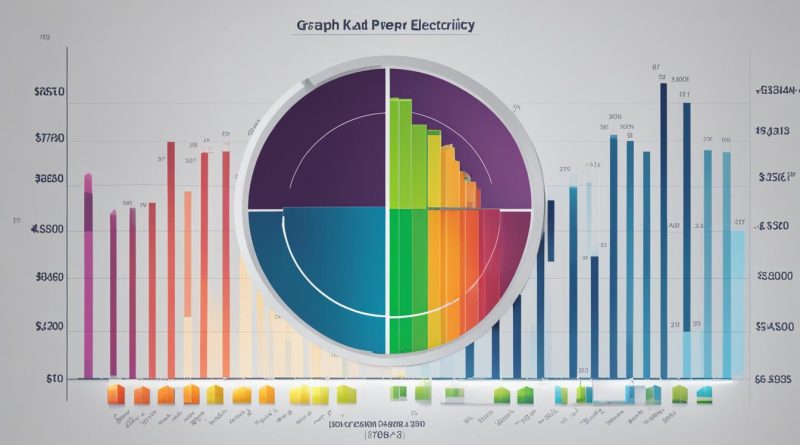Current UK Electricity Prices Per kWh
As electricity prices continue to fluctuate globally, it’s worth exploring the current electricity prices per kWh in the UK. The price of electricity per kWh can be impacted by various factors, including government levies and taxes, wholesale energy prices, network costs, and the different pricing structures offered by UK electricity suppliers.
It’s essential to understand these pricing structures and the various elements that contribute to electricity pricing to make informed decisions that can help reduce energy expenses. In this section, we’ll explore the current prices of electricity per kWh in the UK, discuss the factors that influence them, and the pricing structures offered by UK electricity suppliers.
Key Takeaways
- Current UK electricity prices per kWh can be impacted by various factors, including wholesale energy prices, government levies and taxes, and network costs.
- Understanding the different pricing structures offered by UK electricity suppliers is essential to selecting a tariff that best suits your energy requirements.
- Fixed-rate, variable-rate, time-of-use, and renewable energy tariffs are all pricing structures offered by UK electricity suppliers.
- By making informed decisions about the pricing structure, you could potentially reduce your energy expenses.
Factors Affecting the Price of Electricity per kWh in the UK
Electricity costs affect both businesses and households, and so it is important to know what factors cause the prices to fluctuate. In the UK, the pricing of electricity can be attributed to several elements, including wholesale energy prices, government levies and taxes, network costs, and supplier tariffs.
Wholesale Energy Prices
The wholesale energy prices are based on the cost of generating energy. They are determined by supply and demand of the energy markets, seasonal variations in energy usage, and the cost of producing fuels. Fluctuations in these prices have a significant impact on the price of electricity per kWh.
Government Levies and Taxes
Government levies and taxes are imposed on electricity to fund the development of renewable energy sources and reduce carbon emissions. The Climate Change Levy, which is imposed on non-domestic energy users, is an example of such taxes.
Network Costs
The network costs of electricity distribution and transmission infrastructure also contribute to the pricing of electricity. This includes the expense of maintaining and upgrading the grid, high voltage power lines, and fuel transportation.
Supplier Tariffs
Supplier tariffs refer to the different pricing structures offered by electricity suppliers. These tariffs can be fixed-rate, variable-rate, time-of-use, or renewable energy tariffs. The rates and charges vary between suppliers, and each tariff has different pros and cons.
By understanding the factors affecting the price of electricity per kWh, you can make informed decisions to reduce electricity expenses.

Exploring UK Electricity Tariffs and Pricing Structures
UK electricity tariffs and pricing structures can be complex, making it difficult to compare rates and find the best deal. However, by delving deeper into the variety of options offered by different electricity suppliers, you can find a tariff that suits your energy requirements and budget.
Here are different pricing structures and tariffs available in the UK:
Fixed-rate tariffs
A fixed-rate tariff sets the price of electricity per kWh for a fixed period, usually lasting between one and three years. This arrangement allows customers to avoid any increases in the electricity cost per kWh UK during that time. Fixed-rate tariffs provide predictability and stability for customers who desire to have the same energy bill amount each month.
Variable-rate tariffs
Variable-rate tariffs, like their name suggests, do not have a fixed rate and are subject to changes in the UK energy market. Typically, variable-rate tariffs are cheaper than fixed tariffs offered by electricity suppliers. However, prices can fluctuate month after month.
Time-of-use tariffs
Time-of-use tariff plans offer different rates for electricity based on the time of day, showing one price for peak hours and a cheaper price for off-peak hours. This plan is ideal for those who can adjust their energy usage to less expensive hours of the day.
Renewable energy tariffs
Renewable energy tariffs are plans that permit the customer to consume green energy generated from wind or solar sources by their electricity supplier. Although these plans tend to cost a bit more than non-renewable energy plans, customers can reduce their carbon footprint with renewable energy resources.

As you can see from the image, there are significant differences in the electricity cost per kWh UK from one supplier to another. It pays to shop around and investigate the various tariffs and pricing structures available from the UK electricity suppliers.
Pro Tip: Comparing rates and finding a plan that suits your energy use is easier than ever before. Get a true and unbiased view of the comparisons and understand your bills to make informed decisions.
Conclusion
In conclusion, it is important to stay informed about the current price of electricity per kWh in the UK and the factors affecting these prices. By understanding the different pricing structures and tariffs offered by UK electricity suppliers, consumers can make informed decisions to reduce their energy costs.
Factors such as wholesale energy prices, government taxes and levies, network costs, and supplier tariffs all contribute to the pricing of electricity in the UK. Consumers who are aware of these pricing factors can take steps to manage their energy expenses more effectively.
When considering electricity tariffs, consumers should explore different options such as fixed-rate tariffs, variable-rate tariffs, time-of-use tariffs, and renewable energy tariffs. Understanding these options can help consumers find the most suitable tariff for their energy needs and potentially lower their electricity costs.
Overall, staying informed and making informed choices about electricity tariffs and pricing structures are key to managing energy costs in the UK. With the knowledge of pricing factors and tariff options, consumers can optimize their energy expenditure and save money on electricity bills.
FAQ
What is the current price of electricity per kWh in the UK?
The price of electricity per kWh in the UK varies depending on several factors, including the energy supplier, the region, and the type of tariff. It’s best to check with your electricity supplier or use an online comparison tool to find the current rates in your area.
What are the main factors that affect the price of electricity per kWh in the UK?
The price of electricity per kWh in the UK is influenced by various factors. These include wholesale energy prices, government levies and taxes, network costs, and the pricing structures offered by electricity suppliers. Understanding these factors can help you better understand your energy bills and manage your electricity expenses.
What are the different pricing structures and tariffs available for electricity in the UK?
In the UK, there are various pricing structures and tariffs offered by electricity suppliers. These include fixed-rate tariffs, where the price per kWh remains constant for a certain period of time, variable-rate tariffs that fluctuate based on energy market prices, time-of-use tariffs that offer different rates depending on the time of day, and renewable energy tariffs that support environmentally friendly energy sources. Exploring these options can help you find a tariff that suits your energy needs and potentially reduce your electricity costs.
etc.




